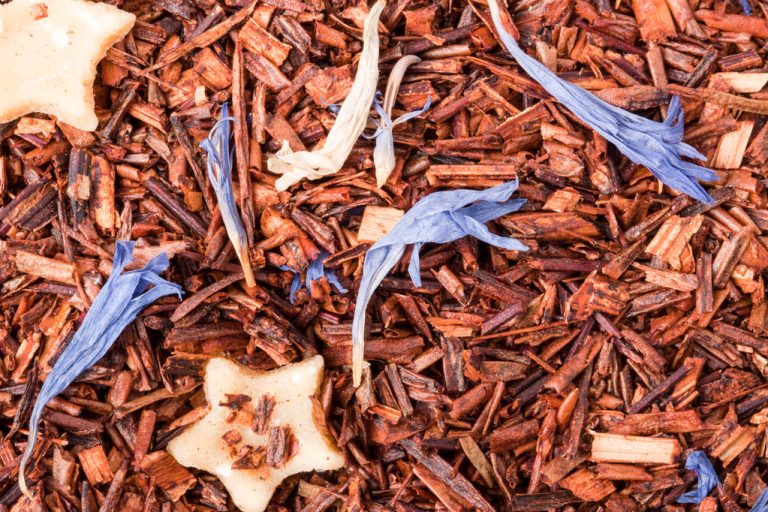There are numerous myths about the effects of red bush tea (also called rooibos tea) from far away South Africa. We will explain to you the actual effect of rooibos tea and also show what disadvantages it has.
Rooibos is a plant species from South Africa. The tea is made from the branches of the plant and is now one of the most popular types of tea in Europe.
Rooibos tea is said to have a number of positive health effects. It is said to be rich in minerals, regulate digestion, help with sleep and relaxation problems and reduce the risk of cancer. For many of these supposed effects, however, there is a lack of corresponding studies and scientific evidence.

Ingredients of Rooibos tea
Myth 1: Good for falling asleep
In contrast to black and green tea, rooibos tea is very well tolerated by many people because it contains no oxalic acid and no caffeine. Thus, it is a good caffeine-free substitute for children and adults suffering from insomnia. However, it is not particularly sleep-inducing.
Myth 2: Lots of minerals
Rooibos tea is considered a good supplier of many different minerals. The tea actually contains traces of vital substances such as sodium, potassium, calcium and magnesium. However, the substances are present in such tiny amounts that they hardly affect our health.
Myth 3: Lowers the risk of cancer
The reddish color of the tea is due to the flavonoids in the leaves. These have an antioxidant effect, so they protect the human organism from free radicals and strengthen our immune system. In addition, certain antioxidants in rooibos tea are said to reduce the risk of cancer. However, the extent to which our body can actually utilize the antioxidants it contains has not yet been clearly clarified.
Rooibos tea as a miracle weapon against common diseases?
Rooibos tea is considered a good remedy for the prevention of arteriosclerosis and should therefore protect us from cardiovascular diseases. This effect was confirmed in a study by the Technical University of Cape Peninsula in South Africa. However, only people who already had an increased risk of cardiovascular disease were examined.
The subjects drank six cups of rooibos tea daily for six weeks. As a result, the cholesterol levels improved. The researchers attributed the effect to the polyphenols contained in the tea, which belong to the group of antioxidants and have a vascular-protective effect. So far, this is the only study that confirms that tea has a positive effect on the heart.
Many other supposed effects of African tea, such as the digestive, anti-inflammatory or antispasmodic effects have not been scientifically proven. So if you expect great health benefits from the mild tea, you will unfortunately be disappointed. However, many people also appreciate the tea for its delicious taste and the warming aromas on cold winter days.

Disadvantages of Rooibos tea
Several studies have found carcinogenic and liver-damaging substances in some rooibos teas. However, these substances are not in the rooibos itself, but in weeds that grow next to the rooibos plant and were accidentally harvested.
Another disadvantage of the popular tea is its poor ecological balance: Since rooibos is only grown in South Africa, it travels a long distance to us. Added to this are the inhumane working conditions under which people on tea plantations often have to work. This applies in particular to black, green and white tea.

